Dolphins tend to consume prey that is of a smaller size than them, so depending on their own size, they may eat penguins. In this regard, bottlenose dolphins rarely consume penguins, whereas killer whales or orcas easily feed on penguins.
Now, when there is a matter about hunting prey, some other questions are associated with this matter. Let’s know all of these.
What Do Dolphins Eat?
Dolphins usually feed on a wide variety of prey items, including fish, squid, shrimp, and other crustaceans. In coastal areas, dolphins primarily consume fish species such as mackerel, herring, anchovies, and sardines.
They also dine on bottom-dwelling invertebrates like crabs and molluscs. Larger dolphin species, such as orcas, are capable of killing larger prey items, including small sharks, penguins, and sea birds. However, these preys are not in dolphins’ daily diet.
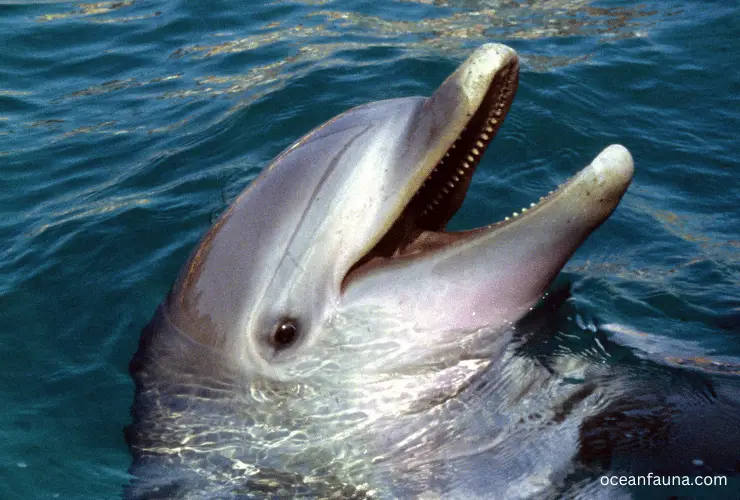
Dolphins hunt using a combination of speed and agility which allows them to quickly locate schools of fish while avoiding predators. They use echolocation to locate their prey in dark waters or murky conditions by emitting sound waves that bounce off objects in their path.
These sound waves then return to the dolphin’s ears allowing them to precisely pinpoint where the object is located before capturing and consuming it. Dolphins also employ cooperative hunting tactics, with members of their pods working together to corral fishes into bait balls for easier capture.
To ensure an adequate food supply for themselves and their young offspring, dolphins may travel long distances searching for optimal feeding grounds.
Do Dolphins Eat Penguins?
If a bigger dolphin encounters a smaller size penguin, then the penguin may become prey to the dolphin. But usually, dolphins do not prefer eating penguins as they hunt and feed on different types of fish and invertebrates.
Killer whales or orcas, the largest mammal in the dolphin family, mostly feed on penguins. These dolphins have been known to target penguins for food. Penguins have also been reported to form part of the diet of dolphins in the Northern Hemisphere.
However, penguins are rarely eaten by bottlenose dolphins, which are by far the most numerous and widespread dolphin species. Bottlenose dolphins usually feed on smaller fish species, such as mackerel or herring, making them less likely to target penguins for food.
Why Does Orca Eat Dolphins?
Killer whales, commonly known as orcas, commonly hunt and eat Pacific white-sided dolphins off the B.C. coast due to their close proximity both geographically and ecologically. In the Pacific Ocean, orcas and dolphins share a similar diet of fish, squids, and other sea life.
Orcas are much larger than dolphins, giving them an advantage when hunting for prey because these aquatic mammals can use their size to dominate smaller marine creatures.
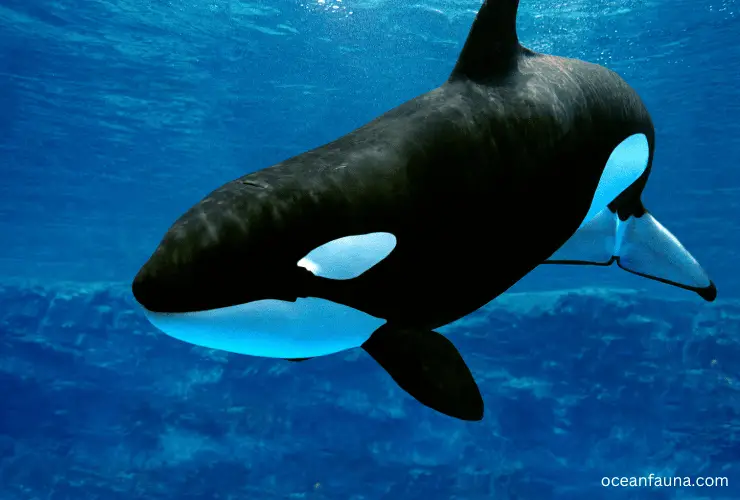
Orcas also have powerful jaws that allow them to easily catch hold of their prey and consume it with ease. Dolphins may be fast swimmers, but they lack the power that orcas possess in order to take them down.
Additionally, orcas are opportunistic predators, which means they will take advantage of any opportunity that presents itself for a meal. This includes targeting dolphins since they are relatively easy targets compared to other species in their habitat, such as sharks or rays.
The echolocation system orcas use also a factor in why they often hunt dolphins. This system allows these predators to accurately locate their prey in the water while remaining hidden. This gives them a major advantage over dolphins who do not possess such capability; thus, it becomes even more difficult for them to escape an orca attack.
Orcas also have long-term memory, which allows them to remember where certain areas offer abundant amounts of food, including dolphins, leading them back there again and again for meals when necessary.
How Does an Orca Catch Penguins?
Orca uses a variety of hunting strategies when it comes to catching penguins. The most common strategy is that of “wave-hunting,” where the Orca will swim in unison just below the surface of the water, creating a wave effect that pushes a raft of unsuspecting penguins towards them. Once within reach, the Orca will launch themselves out of the water and snatch up their quarry swiftly.
Another tactic used by orcas when hunting for penguins is “krill fishing.” Here, orcas will gather in large numbers and swim in circles around an area where krill – a small shrimp-like crustacean – congregate in huge swarms.
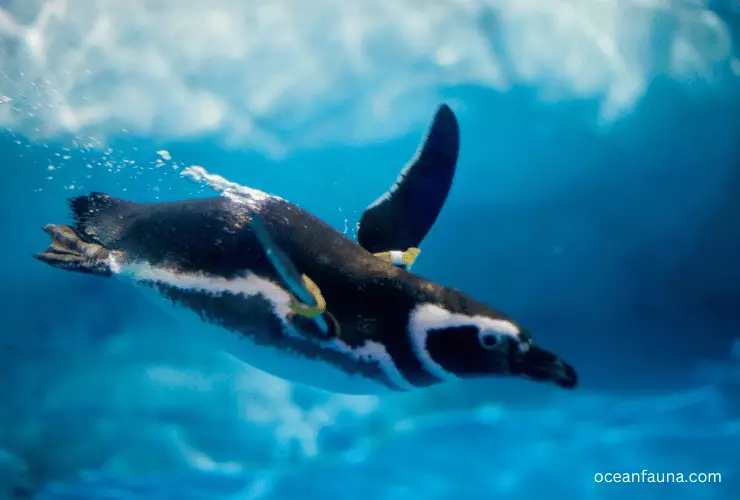
As the krill float to the surface due to turbulence created by the circling orcas, seabirds such as penguins will swoop down to feed on them – only to be intercepted by waiting for Orca who lunge out from under the surface and pluck them out of mid-air!
In addition to these well-known techniques, many experts believe that some pods of Orca may even target specific colonies of penguins for regular consumption over extended periods of time – swimming alongside them during migration routes each year and taking advantage at opportune moments when food supplies are likely low.
This strategy requires great intelligence on behalf of the Orca:
- Being able to remember specific locations.
- Recognize changes in salmon runs.
- Anticipate migratory movements.
- Distinguish between different species, and much more.
Why Do All Dolphins Not Eat Penguins?
Generally speaking, dolphins and penguins don’t interact very often in nature, as they inhabit different types of aquatic habitats. Penguins are found in the colder parts of the Southern Hemisphere, while dolphins prefer warmer waters.
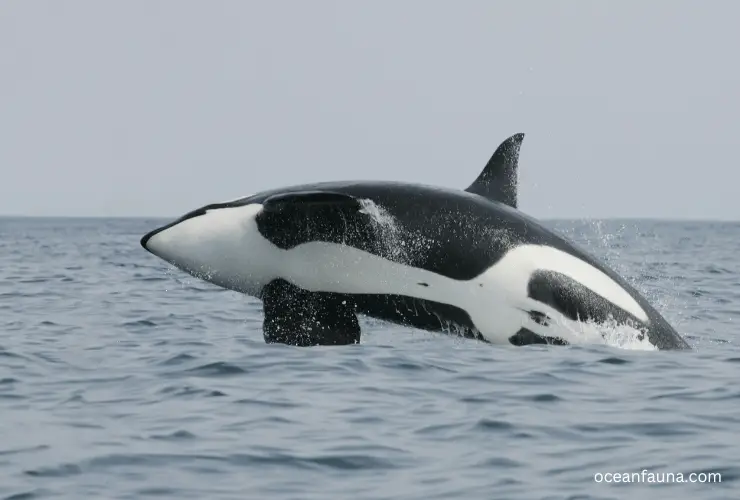
Also, dolphins primarily feed on fish, squid, and crustaceans that are found near the surface, whereas penguins typically hunt for krill and small fish near the ocean floor.
In some cases, interactions between dolphins and penguins have been observed. However, these interactions are usually non-confrontational and involve dolphins swimming alongside or below a group of penguins. Dolphins do not typically attempt to hunt and eat penguins since their diet consists mainly of smaller creatures that live closer to the surface.
Furthermore, due to their size difference (especially when penguins are bigger than dolphins), it can be difficult for a dolphin to successfully capture a penguin.
Dolphins also rely on their speed and agility to capture prey, making hunting slow-moving birds like penguins particularly challenging.
Additionally, many species of dolphin have evolved teeth designed specifically to grab onto slippery prey such as fish or squid – making them ill-suited for tackling larger prey items like birds or mammals.
Nutritional Benefits for Orcas of Eating Penguins
The nutritional benefits for orcas of eating penguins are significant and plentiful. Penguins, as a species, typically feed on small fish, krill, squid, and other crustaceans. As a result, their diet is high in protein, fat, and essential fatty acids like omega-3s. This rich mixture of nutrients helps to keep orcas healthy in many ways.
Penguins’ high protein content helps build muscle mass and maintain energy levels. Additionally, their fatty acids help to protect against oxidative damage caused by free radicals and reduce inflammation throughout the body.
High levels of omega-3s have been linked to improved cardiovascular and neurological health as well as an increased life expectancy in orcas.
Another important element found in penguin diets is calcium. This mineral is essential for strong bones, teeth, and muscles as it helps promote healthy growth and repair processes within the body.
Calcium also plays a role with nerve impulses which help transmit signals from the brain to other parts of the body more quickly than normal.
Furthermore, penguins are also rich in several vitamins, such as Vitamin A, which helps maintain vision along with keeping skin healthy and strong.
Vitamins B6 & B12 help with cognitive development, while Vitamin D assists the absorption of calcium into Orca’s bodies as well as aiding a range of metabolic processes, including managing blood sugar levels and boosting immunity for better overall health.
Lastly, selenium found in penguins can help prevent cell damage due to its strong antioxidant properties, which can help protect against chronic diseases such as cancer or heart disease.
It also assists with thyroid function, which is necessary for maintaining metabolism rates, while iodine helps facilitate hormone production crucial for growth and development in young orcas before they reach maturity age.
Conclusion
Now you know that bigger dolphins like Orca eat penguins, but it’s not a regular occurrence for other dolphins. Penguins inhabit colder parts of the Southern Hemisphere where dolphins don’t live, making it difficult for dolphins to find and hunt them.
Additionally, their size difference and diet make it challenging for most dolphins to successfully capture a penguin. But Orcas, as apex predators, easily consume penguins.
Even if Orca does manage to catch one, there are many nutritional benefits for orcas of eating penguins due to their rich diet, which is full of protein, fat, and other essential vitamins and minerals.
So, while dolphins may not hunt them regularly, they can still take advantage of whatever opportunities arise to acquire nutritious meals such as penguins.

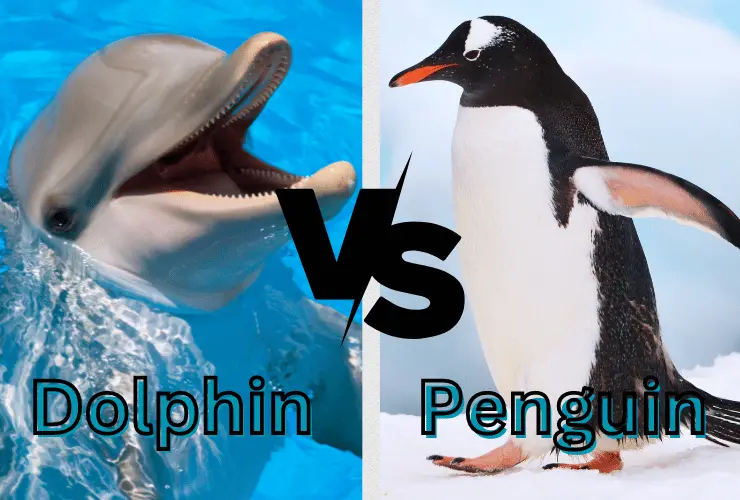
2 thoughts on “Do Dolphins Eat Penguins? [Yes, Here’s Why and How]”